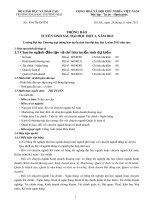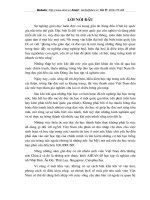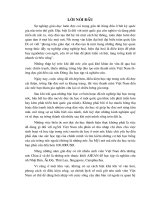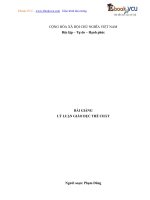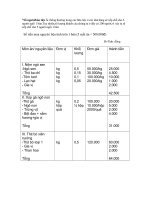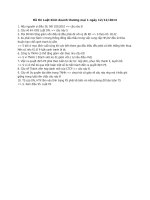English2 The price of success Đại học Thương Mại
Bạn đang xem bản rút gọn của tài liệu. Xem và tải ngay bản đầy đủ của tài liệu tại đây (107.29 KB, 5 trang )
Have you ever had success ?
There are many different definitions of success, but to answer the question "What is success?" This
is very difficult, even for those who are businessmen, celebrities and scholars scientist.
Although not able to find a precise definition of success but for most extremely successful people
like Richard Branson, Arianna Huffington, Deepak Chopra, ... talk about success might be
more accepted.
The founder of the Huffington Post, Arianna Huffington said that money and power are not enough.
Legendary basketball coach John Wooden said that success is a matter of satisfaction.
Zappos CEO, Tony Hsieh said that success was staying true to their own value”.
British politician Winston Churchill thought that success is not giving up.
Billionaire Richard Branson believes success is always working hard.
Speaker Deepak Chopra believes success is a matter of continuing efforts.
Stephen Covey- a famous author for that success is confirmation personal imprint.
So succeed means a matter of satisfaction, is not giving up, is always working hard, is confirmation
personal imprint. A person or thing that achieved desired aims or attains fame, wealth, etc.I
think most people agree with this.
And then, have a question : how to achieve success? What is the price of success ?
No one gives us anything and did not have anything to us without a price given to us to think,
bargain and choose. You want a certain item, it must pay a proportionate amount. To succeed,
you have to sweat, effort. Any choice has a price.
Everyone pays the price for success is different. Time, effort, money, sometimes with tears and
boredom.
Some people have to waste much time, how many new efforts to achieve success.
Some intercontinental experiencing failure, year after year, bored and give up.
Or there are people to achieve success must work tirelessly, no time for family, yourself, your
friends.
Want to succeed must have a plan and pay the price.
And take a look at Steve jobs - former chief executive officer of Apple pay what for that success.
Steven Paul Jobs ( February 24, 1955 – October 5, 2011) was an American businessman. He was
best known as the co-founder, chairman, and chief executive officer (CEO) of Apple Inc.; CEO
and largest shareholder of Pixar Animation Studios; a member of The Walt Disney Company's
board of directors following its acquisition of Pixar; and founder, chairman, and CEO of NeXT
Inc. Jobs is widely recognized as a pioneer of the microcomputer revolution of the 1970s, along
with Apple co-founder Steve Wozniak.
6 months in college, he didn't have interest in hostels, so he slept on the floor of a friend, bartered
coke bottles for the 5 cent deposits to buy food and walk several kilometers on Sunday night to
get one good meal a week at camp Hare Krishna. And then, he left college. 10 years later, he
was on the way to success.
Jobs began attending meetings of the Homebrew Computer Club with Wozniak in 1975. In 1976,
Wozniak invented the Apple I computer. After Wozniak showed it to Jobs, who suggested that
they sell it, they and Ronald Wayne formed Apple Computer in the garage of Jobs's Los Altos
home on Crist Drive.Wayne stayed only a short time, leaving Jobs and Wozniak as the active
primary cofounders of the company.
They received funding from a then-semi-retired Intel product marketing manager and engineer
Mike Markkula. Scott McNealy, one of the cofounders of Sun Microsystems, said that Jobs
broke a "glass age ceiling" in Silicon Valley because he'd created a very successful company at
a young age.
In 1977, Jobs and Wozniak introduced the Apple II at the West Coast Computer Faire. It was the
first consumer product sold by Apple Computer and was one of the first highly successful
mass-produced microcomputer products.
1985, Jobs turned in a letter of resignation to the Apple Board. Five additional senior Apple
employees also resigned and joined Jobs in his new venture, NeXT.
In 1996, Apple announced that it would buy NeXT for $427 million. The deal was finalized in
February 1997, bringing Jobs back to the company he had cofounded. Jobs became de facto
chief after then-CEO Gil Amelio was ousted in July 1997. He was formally named interim
chief executive in September. In March 1998, to concentrate Apple's efforts on returning to
profitability, Jobs terminated a number of projects, such as Newton, Cyberdog, and OpenDoc.
In the coming months, many employees developed a fear of encountering Jobs while riding in
the elevator, "afraid that they might not have a job when the doors opened. The reality was that
Jobs's summary executions were rare, but a handful of victims was enough to terrorize a whole
company." Jobs changed the licensing program for Macintosh clones, making it too costly for
the manufacturers to continue making machines.
With the purchase of NeXT, much of the company's technology found its way into Apple products,
most notably NeXTSTEP, which evolved into Mac OS X. Under Jobs's guidance, the company
increased sales significantly with the introduction of the iMac and other new products.
Jobs was both admired and criticized for his consummate skill at persuasion and salesmanship,
which has been dubbed the "reality distortion field" and was particularly evident during his
keynote speeches (colloquially known as "Stevenotes") at Macworld Expos and at Apple
Worldwide Developers Conferences.
Jobs was a board member at Gap Inc. from 1999 to 2002.
In 2001, Jobs was granted stock options in the amount of 7.5 million shares of Apple with an
exercise price of $18.30. It was alleged that the options had been backdated, and that the
exercise price should have been $21.10. It was further alleged that Jobs had thereby incurred
taxable income of $20,000,000 that he did not report, and that Apple overstated its earnings by
that same amount. As a result, Jobs potentially faced a number of criminal charges and civil
penalties. The case was the subject of active criminal and civil government investigations,
though an independent internal Apple investigation completed on December 29, 2006 found
that Jobs was unaware of these issues and that the options granted to him were returned without
being exercised in 2003.
In 2005, Jobs responded to criticism of Apple's poor recycling programs for e-waste in the US by
lashing out at environmental and other advocates at Apple's annual meeting in Cupertino in
April. A few weeks later, Apple announced it would take back iPods for free at its retail stores.
The Computer TakeBack Campaign responded by flying a banner from a plane over the
Stanford University graduation at which Jobs was the commencement speaker. The banner read
"Steve, don't be a mini-player--recycle all e-waste."
In 2006, he further expanded Apple's recycling programs to any US customer who buys a new Mac.
This program includes shipping and "environmentally friendly disposal" of their old systems.
The success of Apple's unique products and services provided several years of stable financial
returns, propelling Apple to become the world's most valuable publicly traded company in
2011. Jobs founded NeXT Inc. in 1985 after his resignation from Apple with $7 million. A year
later he was running out of money, and with no product on the horizon, he sought venture
capital. Eventually, Jobs attracted the attention of billionaire Ross Perot who invested heavily
in the company. The NeXT computer was shown to the world at what was considered Jobs's
come back event, a lavish (invitation only) gala launch event and was described as a
multimedia extravaganza. It was held at the Louise M. Davies Symphony Hall, San Francisco,
California on Wednesday October 12, 1988. NeXT was acquired by Apple Inc. in 1997.
In 1986, Jobs funded the spinout of The Graphics Group (later renamed Pixar) from Lucasfilm's
computer graphics division for the price of $10 million, $5 million of which was given to the
company as capital and $5 million of which was paid to Lucasfilm for technology rights.
Jobs was perceived as a demanding perfectionist who always aspired to position his businesses and
their products at the forefront of the information technology industry by foreseeing and setting
innovation and style trends.
After the company was founded Apple, Steve Paul Jobs's career skyrocketed up. Employees of the
company Apple was founded 10 years has amounted to 4000, and its value has reached a record
figure in the gas: US $ 2 billion. But after eight years of operation, the company's sales were
going down Apple. To improve this situation, in 1983, Steve had convinced John Sculley.When
two people do all the ideas and perspectives of different work, the inevitable will happen
controversy, cracking. This is causing the company Apple does not solve the immediate
problems but also get into more difficult situations. At that time, the proposals and plans to
restore the company's John Sculley was great approval from Apple board, and Steve Paul Jobs
in 1985 had parted company with pity but which he founded. "When parting Apple, I feel like I
have lost a body part so. I just have the feeling that someone hit hard from behind, then was
released into the sky. When I was only 30 years old, still a lot of work to do but suffered a
painful defeat like, mental decline is inevitable, "Steve said about the time when he had just left
Apple to go .
When Steve Jobs returned to Apple in 1997, the company is on the brink of bankruptcy by earlier
massive hit series version different Macs without orientation.
He ordered all employees to focus on developing the four great products corresponding to four cells
in the matrix above and discontinued production of all other products. That, Steve Jobs rescued
Apple on track to be a hospice.
According to Jobs, the company's groundbreaking not only first place generates ideas but also know
how to overcome the opponent when being left behind.
When failure with the iMac computer line due to unforeseen trends music on the desktop of the
user, instead of adjusting the product to rival stalkers, Jobs decided to create a new integrated
system that works changing the face of the music industry.
In 2004, Steve was diagnosed with cancer, the test results showed he had a tumor in the pancreas.
Doctors have assured this result is absolutely correct and this is not a cure for a disease, while
maintaining his life is only from 3 to 6 months. The doctor also advised him to quit his job and
returned to the nursing home. "That means I should fatalistic for disease eats each day in the
body. That means I return home informing people about their health situation and bring their
worries. It also means that I should go bye everyone before it's too late, "Steve Paul Jobs
talking about his feelings after hearing an announcement from doctors.
But at that moment, a miracle occurred, after research and careful re-examination of Steve cases,
doctors have reported a revived spirit of Steve: His illness Surgery may be. And as expected of
people, after the surgery, the health of Steve quickly recovered and soon he was discharged in
the overjoyed family and colleagues. After facing death, the spirit and strength work of Steve
seems to be greatly increased and motto like none he was promoted to the maximum extent.
Before the discovery of pancreatic cancer and leave at Apple in August 2011, a day of Steve Paul
Jobs was starting at 6 am, after putting the children to school, he worked at home about 1 hour,
followed by the 9 hours working at the computer company Apple, when he was working there
all night if necessary. For his wife and 4 children, he always was a husband and father form
ideal. For his staff, CEO Steve Paul Jobs is the image of a workaholic CEO ham, a great talent
for leadership and manager- a genius without a degree.
The value of success is defined by price which must pay for it. Any career is always arduous.
